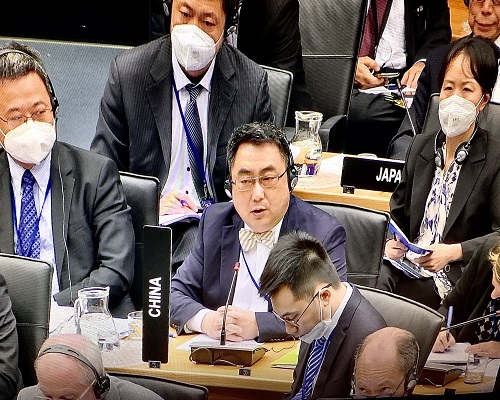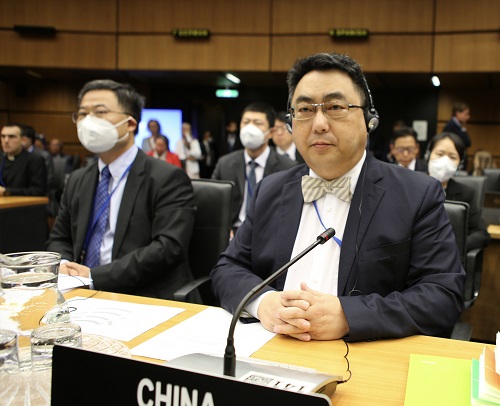Ambassador Wang Qun: the IAEA Board of Governors Decided by Consensus for Four Consecutive Times to Examine the Agenda Item Proposed by China on AUKUS Nuclear Submarine Cooperation
The IAEA Board of Governors convened its regular session on 12-16 September 2022 in Vienna. The meeting decided by consensus for the fourth time to discuss the issue related to AUKUS nuclear submarine cooperation as a standalone item. Ambassador Wang Qun, Permanent Representative of China to the UN office in Vienna, was interviewed by Chinese and foreign journalists after the adoption of the above-mentioned agenda.
Ambassador Wang Qun said that, at China's request, the IAEA Board of Governors decided by consensus for the fourth consecutive times to examine the “Transfer of the nuclear materials in the context of AUKUS and its safeguards in all aspects under the NPT” as a standalone item.
This repeated acceptance by consensus thwarted attempts by some countries to hijack the Board. This was also a victory of the “Vienna spirit” over “hegemony”. This reflected the international community's concern over the transfer of nuclear weapon materials under the nuclear submarine cooperation and shows that the U.S.-style “small circle” practice was unpopular at the Agency.

Ambassador Wang Qun stressed that the transfer of nuclear materials under the AUKUS nuclear submarine cooperation was in essence nuclear proliferation and the three countries must abandon this action which would jeopardize the world. The nuclear submarine cooperation exceeds the existing NPT system and the mandate of the IAEA secretariat. This issue cannot be addressed by these three countries on their own and must be addressed by the Member States of the Agency. China has always advocated for thorough discussions through the intergovernmental process. Through the previous three rounds of discussions at the Board, the international community and the Member States have developed an increasingly thorough and profound understanding of the severely negative implications of AUKUS nuclear submarine cooperation, in particular the grave proliferation risks it poses.
Ambassador Wang Qun pointed out that the IAEA was the only and proper forum that would provide the international community with a platform to discuss the issue of the AUKUS nuclear submarine cooperation in an impartial and objective manner and in accordance with the mandate given by the Statute.
Ambassador Wang Qun further stated that the recent release of the Director General's report was procedurally a step in the right direction in so far as it urged the three countries to fulfil their legal obligations on non-proliferation. Substantively, the report had serious flaws because it conflicted with NPT, wishes of the Member States and the international community and the mandate of the Director General.

Ambassador Wang Qun pointed out that while the Member States would no doubt have the opportunity to further their discussions of the AUKUS nuclear submarine cooperation issue. So far the three countries have completely disregarded the relevant item adopted by consensus on three occasions by the Board of Governors and the intergovernmental process that was formally launched on that basis. They went back to the drawing board and duplicated the item on the same issue, blatantly engaging in political manoeuvring, unabashedly flouting the rules of the Agency, shamelessly hijacking the Secretariat into "whitewashing" their nuclear proliferation practices and brazenly creating divisions in the Agency. People can tell right from wrong and the despicable scheme of the three countries will eventually fail.
Ambassador Wang Qun concluded by saying that a just cause always enjoys abundant support while an unjust one finds little. He hoped that the Agency would continue to uphold neutrality and provide a platform to address the impact of the trilateral nuclear submarine cooperation on the NPT system. He also hoped that through this discussion, Member States would focus on the "original sin" of the illegal transfer of nuclear materials, discover the reality and truth of the situation and thus explore solutions to jointly defend the NPT and maintain international peace and security through concrete actions. China hopes that the three countries will not create additional obstacles for the agency to fulfil its functions and will not continue to sabotage the international order, damage the multilateralism and destroy world peace.